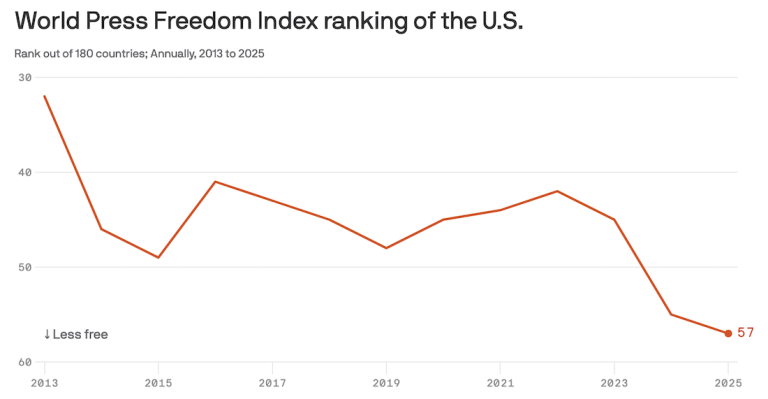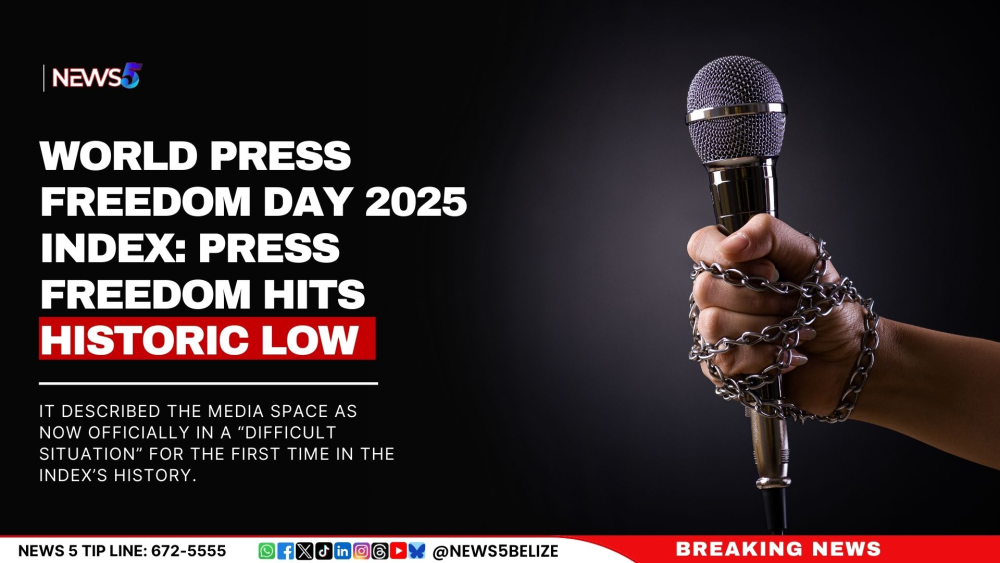
May 3, 2025 is World Press Freedom Day
New York, N.Y. — In its 2025 World Press Freedom Index, Reporters Without Borders (RSF) has declared global press freedom at an unprecedented low, marking a significant decline in the conditions for journalism worldwide.
The annual report, released on May 2, 2025, highlights a “difficult” global situation, with economic pressures, political hostility, and safety concerns driving the downturn. The report assesses 180 countries across five indicators: political context, legal framework, economic context, sociocultural context, and safety.
The U.S. has seen a notable decline, dropping two places to 57th in the rankings.
RSF attributes this to actions under President Donald Trump’s second term, which began in January 2025. The organization points to funding cuts for state-backed broadcasters like Voice of America and Radio Free Europe/Radio Liberty, as well as reductions in foreign aid supporting overseas media outlets.
These measures, RSF claims, have contributed to an “alarming deterioration” in U.S. press freedom, with vast regions becoming “news deserts” where local journalism struggles to survive. Over 60% of journalists surveyed in states like Arizona, Florida, Nevada, and Pennsylvania reported difficulty earning a living wage, and 75% noted that media outlets face economic instability.

RSF’s economic indicator, which measures the financial health of journalism, has reached its lowest point in the index’s 23-year history. Globally, 160 out of 180 countries reported that media outlets achieve financial stability “with difficulty” or “not at all.”
The rise of online advertising, which reached $247.3 billion in 2024, has largely benefited tech giants like Meta, Google, and Amazon, leaving news organizations with dwindling resources. This economic strain has led to newsroom closures and increased media ownership concentration, further threatening editorial independence.
Europe remains the region with the most press freedom, with seven countries—led by Norway, Estonia, and the Netherlands—rated as having a “good” press freedom environment. However, even Europe is not immune to challenges.
Germany, previously a top-10 performer, slipped to 11th place due to an “increasingly hostile working environment” for journalists. RSF noted a rise in attacks from far-right groups and difficulties faced by German journalists covering the Middle East conflict. Despite these setbacks, the European Union-Balkans zone continues to lead global rankings, though Eastern Europe and Central Asia have seen the steepest regional decline.
Globally, more than half of the world’s population lives in countries where press freedom is classified as “very serious,” according to RSF Managing Director Anja Osterhaus. “Independent journalism is a thorn in the side of autocrats,” she said, emphasizing the role of state-driven censorship and economic pressures in stifling critical voices.
Countries like China, North Korea, and Eritrea rank at the bottom of the index, while Palestine (163rd) faces a “disastrous” situation, with nearly 200 journalists killed in Gaza amid Israel’s military operations.
The report also highlights regional disparities.
In Latin America, Argentina (87th) and El Salvador (135th) have seen sharp declines due to government hostility and propaganda, while Brazil (63rd) shows signs of recovery post-Bolsonaro. In the Middle East, Palestine remains the deadliest place for journalists, and in Africa, political instability in countries like Haiti (112th) has plunged media economies into chaos.
RSF’s findings come ahead of World Press Freedom Day on May 3, 2025, underscoring the urgent need for action to protect journalism. The organization calls for stable and transparent financial conditions to ensure media independence and pluralism. “The media economy must urgently be restored to a state that is conducive to journalism,” said RSF Editorial Director Anne Bocandé, warning that the production of reliable information is increasingly at risk.
As press freedom faces mounting threats, RSF’s 2025 index serves as a stark reminder of the challenges confronting journalists worldwide. From economic hardship to political repression, the global media landscape is under strain, with implications for democracy and the public’s right to information.
Global Press Freedom Hits Record Low in 2025, RSF Reports (May 3, 2025)
#PressFreedom #RSFIndex #WorldPressFreedomDay #Journalism
Tags: press freedom, World Press Freedom Index, United States,
RSF, Trump, Europe, Germany, journalism, media
